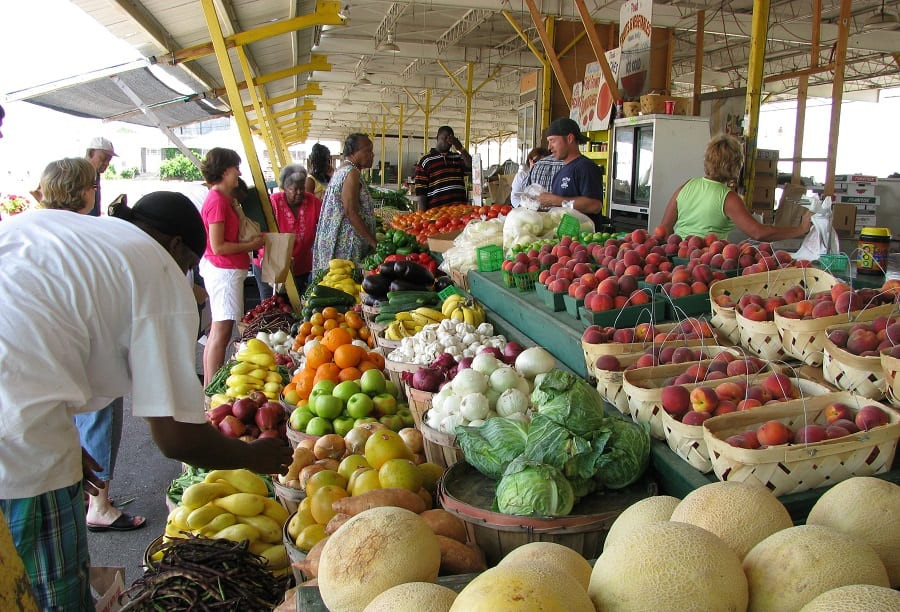Refreshing Zoning Regulations to Support Local Farmers Markets and Community Gardens
By: Northern Virginia Health FoundationCome summertime, Fairfax County will be a friendlier place for farmers markets and community gardens, thanks to a much-needed update of the county’s zoning regulations.
Farmers markets and community gardens are popular ways to bring fresh, healthy foods to neighborhoods where residents don’t have easy access to them.
In a 2015 survey by the Fairfax Food Council, SNAP benefits at farmers markets ranked second as an option for expanding healthy foods options among households making $50,000 or less a year.
It makes sense: Go to most farmers markets today, and you have an array of choices, including not only farm-fresh vegetables and fruits, but locally produced meats and seafood, dairy products such as milk and eggs, and even breads and other baked goods.
But if you consult Fairfax County’s Zoning Ordinance, you will find that most of those wares are not permitted.
Outdated Zoning Regulations
Under current regulations, farmers markets in Fairfax County are supposed to offer only produce and living plants.
Not only that, but if you wanted to establish a new farmers market in Fairfax County, you would find the process confusing and prohibitive.
Arcadia Center for Sustainable Food and Agriculture discovered this when we explored bringing one of our Mobile Markets to the Baileys Crossroads neighborhood in Falls Church, where access to fresh, healthy foods is limited. We found that our options for siting a market were more limited than we imagined.
The same goes for community gardens in Fairfax County. There are many restrictions that seem unnecessary. For example, under the current ordinance, a church can’t plant a community garden on property it owns if that property doesn’t have a building on it.
It’s all because the county’s zoning regulations haven’t been updated for 40 years—until now.
Creating “Healthy-Food-Friendly” Zoning Codes
With support from the Northern Virginia Health Foundation, we have worked with the Fairfax County Department of Planning and Zoning and the Fairfax Food Council to modernize the zoning code and make it more “healthy-food-friendly.”
The proposed updates have been shared at community outreach events and are scheduled for public hearings on April 24th and June 25th. Hopefully, the Fairfax County Board of Supervisors will approve the changes following the June 25th hearing. Among the changes:
Farmers markets will be able to operate year-round instead of just seasonally.
The permitting process will be simplified, conferring a two-year permit with an initial fee and biennial renewal.
Markets will be allowed to sell a broader selection of goods, from meats to jellies and jams to soaps and dried flowers.
Siting will be easier for both farmers markets and community gardens.
When we approached the Planning and Zoning Department about the regulations regarding farmers markets and community gardens, officials acknowledged that they needed an update.
Collaborating for a More Equitable Food System
Working with the Food Council, we proposed recommendations and language for the Planning and Zoning Department to consider. From start to finish, it was a collaborative process.
In fact, the project has resulted in increased collaboration and coordination. For example, zoning officials have incorporated a review by the Northern Virginia Soil and Water Conservation District into the administrative approval process for new community gardens to prevent erosion and ensure that runoff doesn’t get into local water supplies. That environmental component did not exist before.
In addition, the Food Council is developing a step-by-step guide for people who want to start a new community garden or farmers market.
With clearer, less restrictive, and more modern regulations and a consumer-friendly how-to guide, we hope to see an uptick in local fresh-food initiatives. We know that several communities are interested in planting gardens but have lacked information on where and how to start.
Launching a farmers market is a bit more complicated, but we believe that the updated zoning rules will encourage more creative ways to bring fresh foods to neighborhoods in need—possibly through Mobile Markets or smaller, pop-up markets.
Ultimately, we believe that the zoning update will contribute to a more equitable and sustainable local food system in Fairfax County. And that means all our residents will enjoy greater opportunities for good health.

